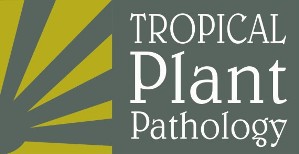Isolate UFV-101 of Bacillus cereus was selected in previous studies for promoting growth inducing resistance in plants. In a previous study, supernatant from cultures of the microorganism in a liquid medium was found to induce resistance in tomato foliage against the pathogens Pseudomonas syringae pv. tomato, Xanthomonas vesicatoria, Alternaria solani and Corynespora cassiicola. In the present work the microorganism was grown in a minimal medium for 48 h and the cells precipitated for centrifugation. The supernatant was concentrated by lyophilization, dialyzed in a 12 kDa cut-off point membrane and fractioned in column containing Sephadex G25 balanced in PBS buffer. The fractions corresponding to a protein peak were applied to tomato seedlings. After four days leaflets were collected and inoculated with the pathogen. C. cassiicola. The numbers of lesions produced by the pathogen on leaflets exposed to the bacterial supernatant were similar to those exposed to acibenzolar-S-methyl but fewer than in those treated with water. It is concluded that the supernatant contained protein which induced resistance in the tomato leaves against C. cassiicola.
Induced resistance; rhizobacteria; PGPR


